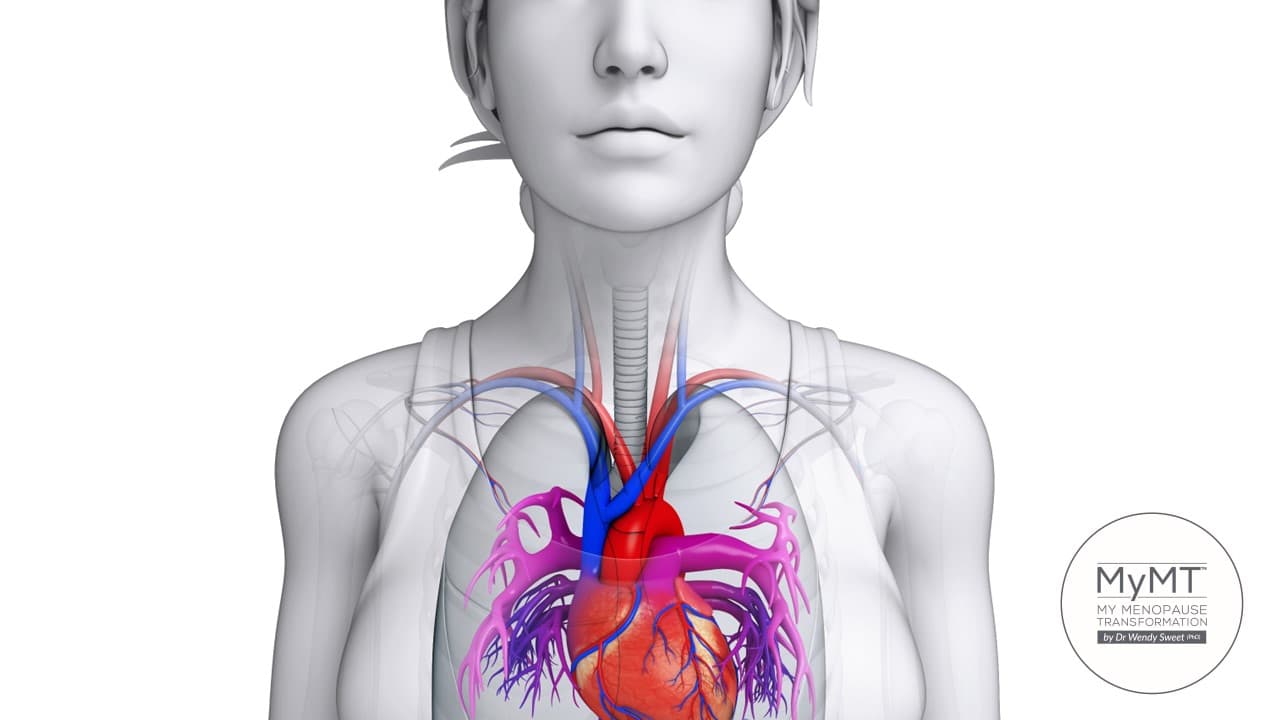In 2010, leading cardiologists from five European countries attended a seminar in Belguim which resulted in an article published a year later called, ‘Red Alert for Women’s Heart: The Urgent Need for More Research and Knowledge on Cardiovascular Disease in Women.’ (Maas, van der Schouw et al., 2011).
One of the main points that the article made was that despite significant differences between men and women in the presentation of most cardiovascular diseases, women are still inadequately represented in research on heart disease. A decade on, according to one of the lead authors, world-renowned Cardiologist from the Netherlands, Dr Angela Maas, some gains have been made, but not enough.
One of these gains has been the understanding that the female heart as it ages, undergoes considerable change when oestrogen and progesterone decline with ageing. Hence, menopause really does matter to women’s cardiovascular health as they move into their post-menopause years.
How we transition through menopause especially matters to the changing nature of our blood pressure, and if you are still experiencing hot flushes and you are in post-menopause, then don’t blame the menopause – because it’s not. It’s the natural ageing of your heart muscle, nerves and vascular system (blood vessels). Hence, I wonder, as you line up for your HRT and all those endless menopause supplements that are being promoted to us, if you are also getting your blood pressure checked? If it’s reading higher than normal, then you aren’t alone.
Your midlife heart health offers a critical window for implementing early intervention strategies to reduce cardiovascular risk.
Why we aren’t recognising this more in lifestyle changes that we should be making during our menopause transition had me perplexed. At the time that my own menopause symptoms were troubling me, I had no idea that I should be changing my diet and exercising in ways that benefit my cardiac health in my 50s.
As you can see from the image below, hypertension can occur across a women’s lifecycle (Wenger et al, 2018). I’ve added in many of the potential causes for women in menopause and post-menopause.
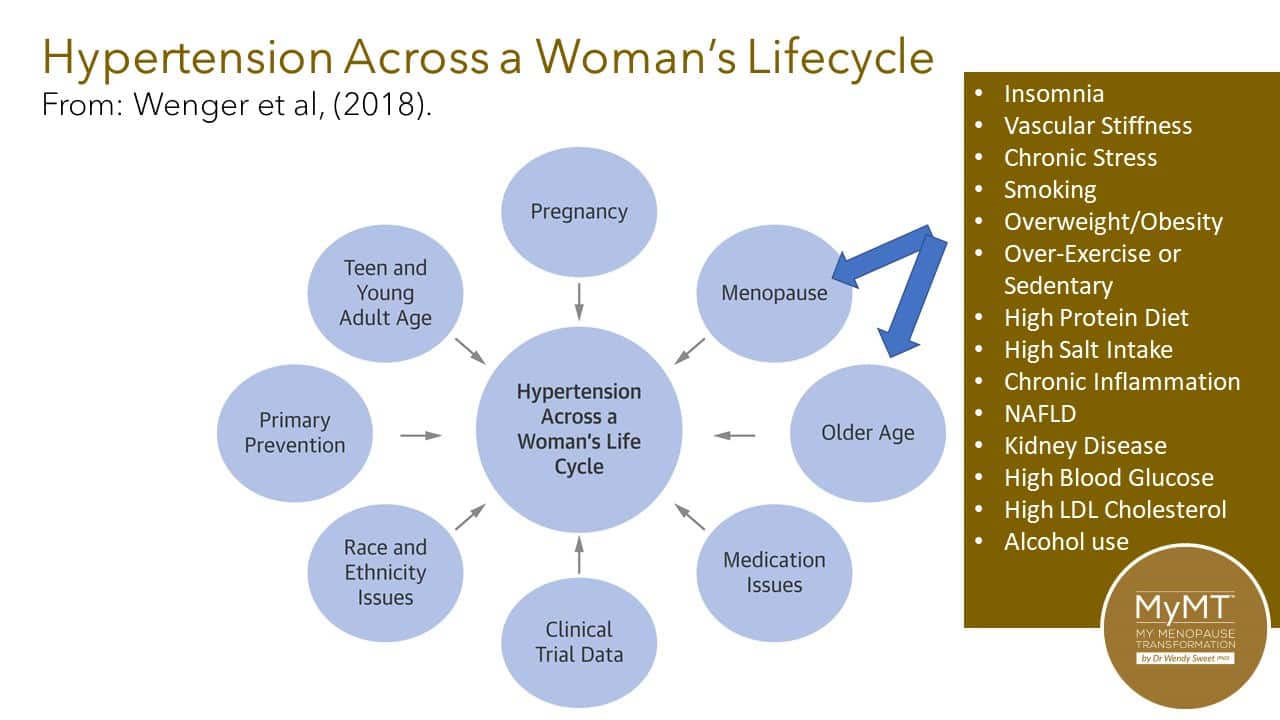
Menopause isn’t ‘just’ about hot flushes – it’s about your changing blood pressure too.
What makes your blood pressure shoot through the roof? Do you know? I know when I’m feeling that my ‘blood has boiled over’ – it’s usually due to work (or family)-related stress, feeling time-poor, lifting heavy weights or a bit of road-rage. But after reading new research about the circadian cycle of our blood pressure during and after menopause, I never would have thought to place changing blood vessels in menopause and insomnia at the top of the ‘hypertension-causes-in-menopause’ list. Did you?
The term ‘hypertension’ means high blood pressure. High blood pressure develops when blood flows through your arteries at higher-than-normal pressures. Whilst it’s absolutely normal for your blood pressure to change throughout the day based on your activities, lifestyle and dietary patterns, there are specific risk factors that are unique to women in menopause that are separate from genetic risk factors. This includes,
- history of smoking
- underlying kidney disease
- being overweight or obese
- high LDL cholesterol and low HDL cholesterol
- living a sedentary lifestyle (or doing too much exercise)
- changes to reproductive hormones which impact blood vessel elasticity
- sleep disturbance
- increased hot flushes
- alcohol consumption
- liver inflammation
- medications
Have you had your blood pressure checked recently? If so, then you might like to check it against the new American Heart Association Guidelines (AHA, 2020). The two different numbers are the systolic (top number) and diastolic (bottom number. The Systolic pressure is the pressure when the ventricles pump blood out of the heart. The Diastolic pressure is the pressure between heartbeats when the heart is filling with blood.
For most women, a normal blood pressure is less than 120 over 80 millimeters of mercury, which is written as your systolic pressure reading over your diastolic pressure reading—120/80 mm Hg. Your blood pressure is considered high when you have consistent systolic readings of 130 mm Hg or higher or diastolic readings of 80 mm Hg or higher.
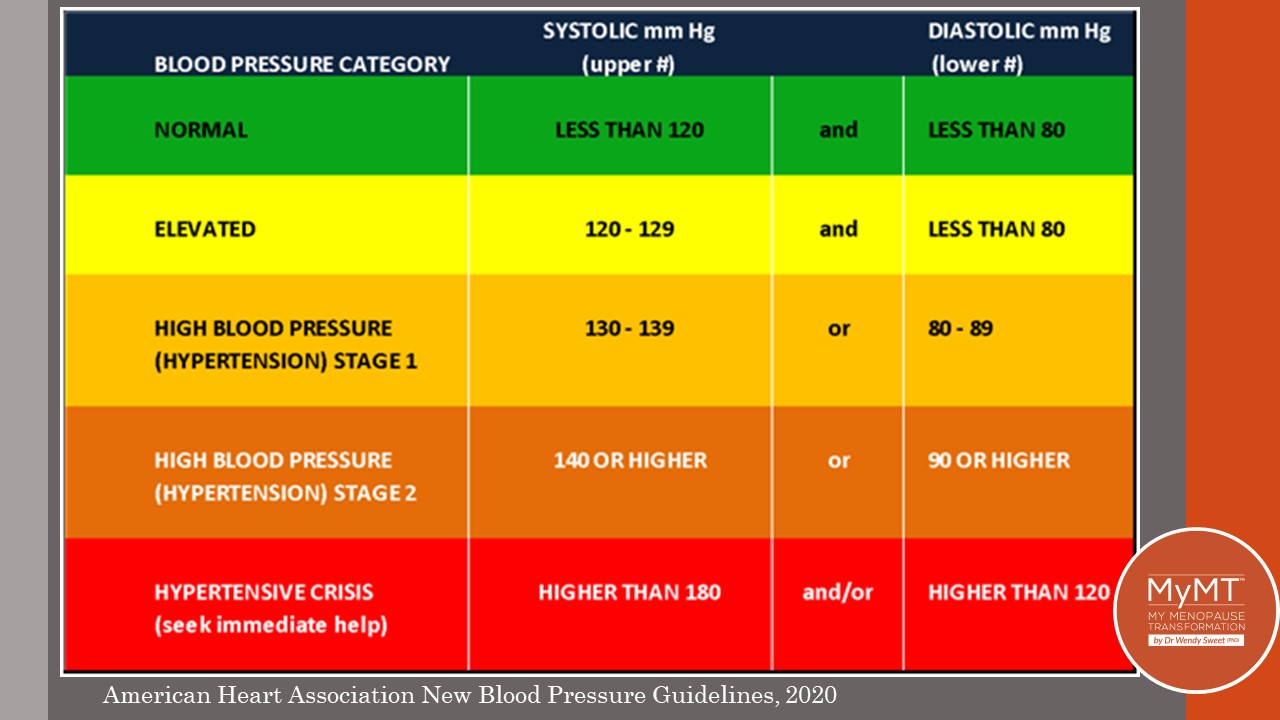
According to Cardiologist, Dr Angela Maas, blood pressure increases gradually over time and if women aren’t sleeping, then the disappearance of a nightly dip in blood pressure can be a sign of rising blood pressure. Specifically for women in menopause experiencing night sweats, this is more related to blood pressure remaining elevated overnight, because one of the stress hormones called cortisol, remains elevated too.
That’s why, as I mention in the 12 week MyMT™ programmes, it is essential that women re-train their brain to sleep all night again. Not sleeping as part of our menopause transition is the slippery slope towards heart disease in post-menopause.
And if you are in post-menopause and still having hot flushes, then don’t blame menopause – you are through menopause – blame your changing blood vessels and heart muscle, both of which lose elasticity and become ‘stiffer’, as you age.
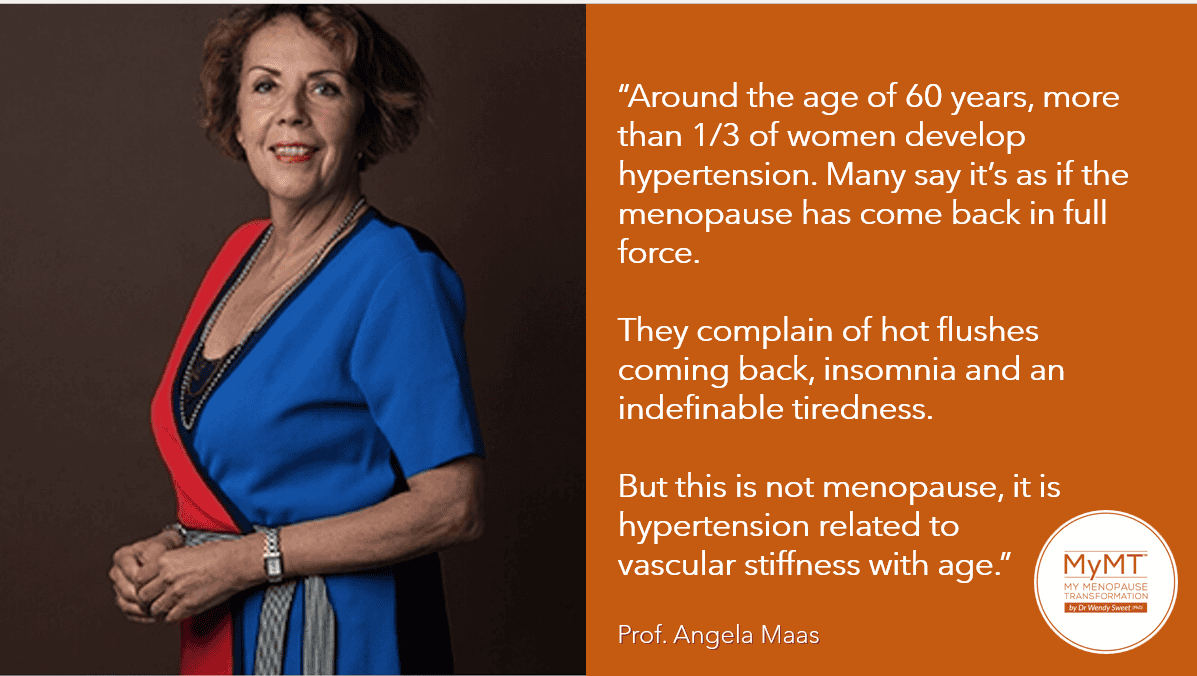
The Circadian Cycle of your Blood Pressure
Blood pressure varies, not only within a 24 hr circadian (day/night) cycle, but also throughout the seasons. Based on your circadian cycle, it tends to be lower in the mornning and higher towards dinner time. There is also a seasonal influence – during the colder months it tends to be higher than in the warmer months.
Which makes sense, because when we are warmer, the blood vessels dilate more to take heat towards the surface of the skin. When blood vessels are wider, then blood pressure is reduced. During colder weather, blood vessels become more constricted as the body tries to hold onto heat, so blood pressure is increased to maintain your body temperature.
Do you have any symptoms of high blood pressure? It took me a while to work out that there was a correlation between my menopause symptoms and my increased blood pressure and cholesterol as I moved into post-menopause.
If you’ve got any of these symptoms and think that they are related to changing hormones in menopause, then yes they are, but because of your changing hormones, this changes your blood pressure. The symptoms you are experiencing may be a sign that you really do need to get to your Doctor to talk about your blood pressure!
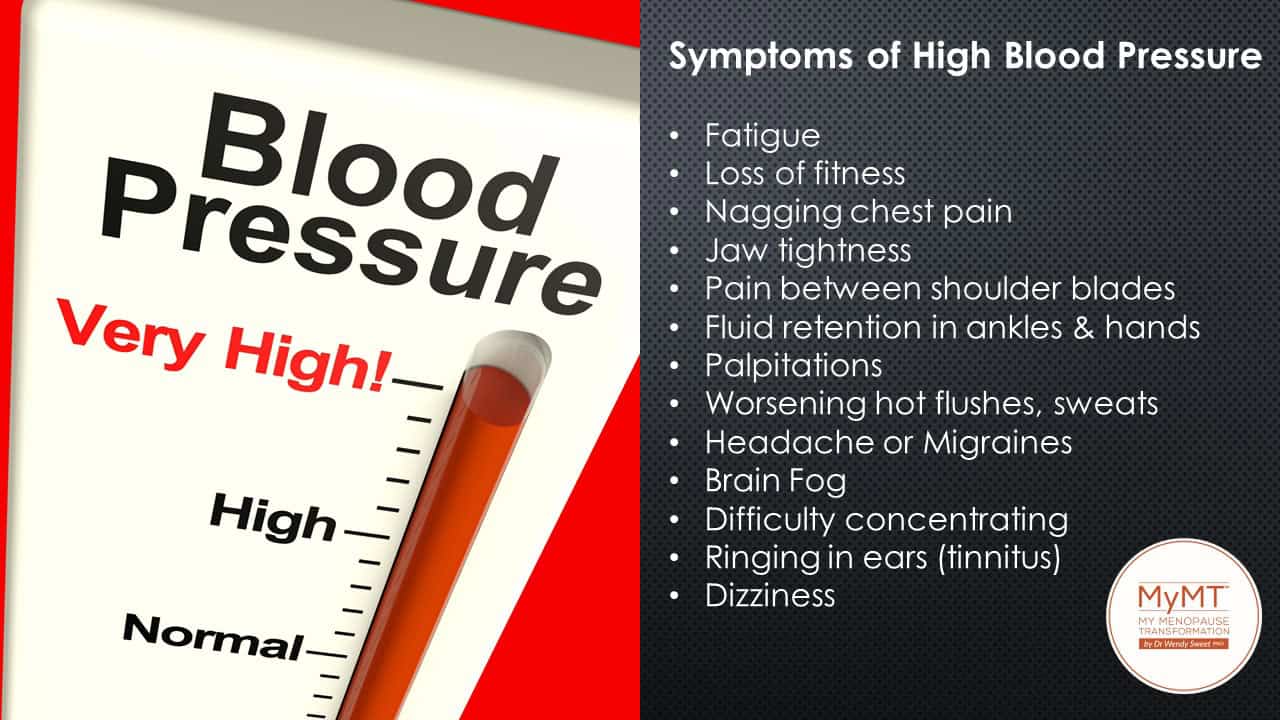
Changing your Lifestyle in Mid-Life is Important in Managing Hypertension
One of the most challenging things to do as we age, is to change how we look after ourselves, and according to the thousands of women on the MyMT™ programmes, we also need to learn to put our health at the forefront of our focus.
There are four main evidenced lifestyle strategies that I focus on with women who join me on the MyMT™ programmes. These include:
- Restoring sleep patterns to better reflect our circadian cycle.
- Reducing inflammation in the liver, gut and blood vessels which also contributes to hypertension.
- Reducing stress.
- Restoring energy levels through a modified Mediterranean Dietary approach.
For example, it is well known that daily walking improves blood pressure in women, but so too does an increased intake of citrus fruits. Studies on women (aged 35 to 77 yrs) living in Hiroshima Province in Japan, showed that over a 5 month period of ingesting lemon juice daily as well as walking for a minimum of 30 minutes daily, reduced systolic blood pressure (the top number) significantly.
Whilst it’s known that aerobic exercise helps to improve the vascular stiffness reported in post-menopausal women (Tanaka, 2020), it is less well known that Citrus fruits such as lemons, contain bioactive compounds such as citric acid, that promote absorption of calcium and magnesium in the small intestine. Both these minerals are essential for heart and blood vessel function as we age.
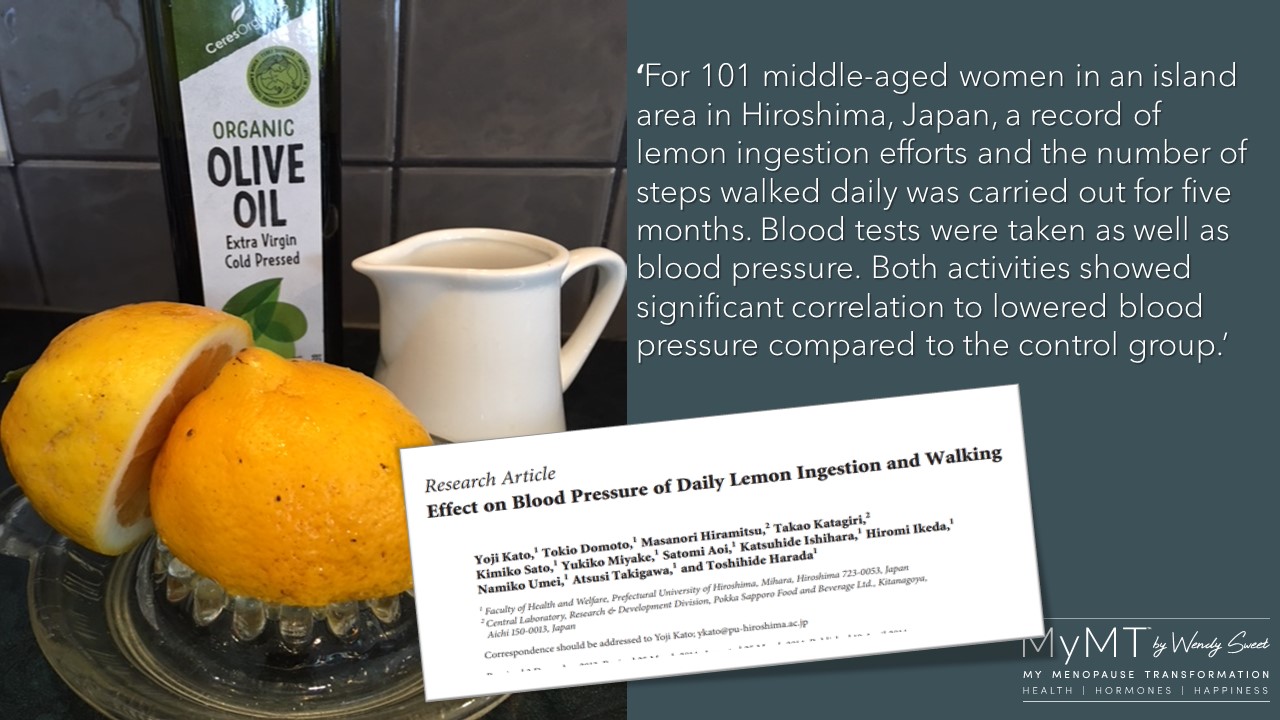
You will love what you learn on the 12 week MyMT™ programmes. Circuit Breaker is for you if you are thinner or leaner. Transform Me is for you if you are overweight. They are ON SALE throughout the month of April. So, please don’t miss out – you can learn more about them below.
Not only will you learn how to adjust your lifestyle to better suit your menopause transition, but also how to manage your cardiac health with lifestyle solutions, restore your joint and gut health and if you need to, lose weight and manage hot flushes and more! And yes, I will motivate you to become more active too. It’s good for your heart!
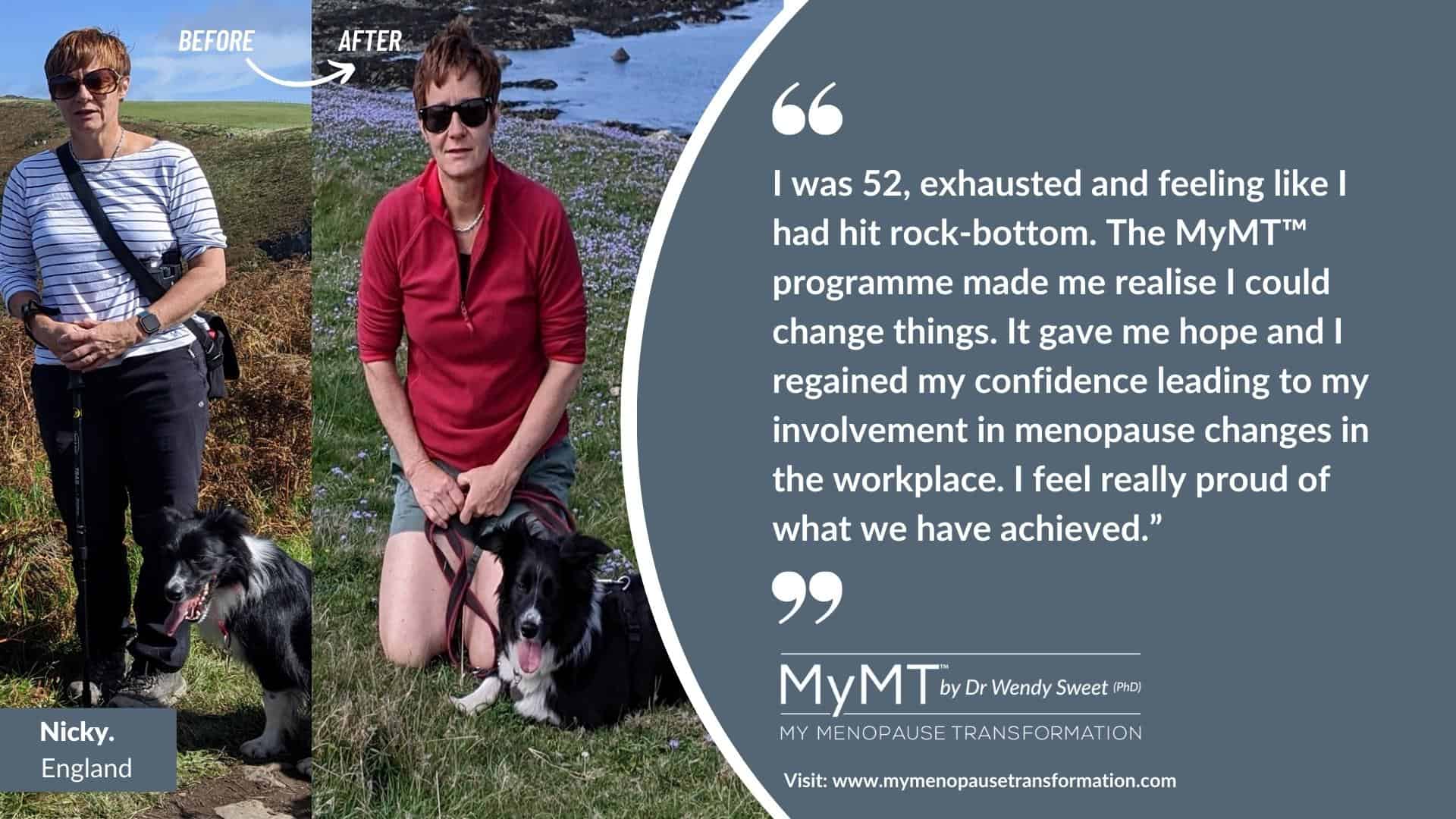
Can I help you with your symptoms?
If you are struggling with your mid-life weight, health or symptoms, then come on board if you can into my 12 week online programmes. MyMT™ 12 week programs are normally available for NZ$299 each, but my APRIL MENOPAUSE AT WORK sale is on, with savings of NZ$75 for any of the programmes.
Or as a starting point, you can purchase my online Masterclass on Menopause. This is only NZ$15 (approx. AUS$14 or UK£7.5). I hope you can join me in this powerful 2 hour webinar, which is all updated and revised in 2023 and is now in two parts. The great news is that now you can watch it anytime, anywhere and even pause it whenever you like and go and make yourself a cuppa too.

References:
Bowen, K.J., Sullivan, V.K., Kris-Etherton, P.M. et al. Nutrition and Cardiovascular Disease—an Update. Curr Atheroscler Rep 20, 8 (2018).
De Pergola G, D’Alessandro A. Influence of Mediterranean Diet on Blood Pressure. Nutrients. 2018 Nov 7;10(11):1700.
Gordon, A. & Mendes, W. (2021). A large-scale study of stress, emotions, and blood pressure in daily life using a digital platform. PNAS, 118 (31) e2105573118.
Kato, Y., Domoto, T., Hiramitsu, M., Katagiri, T., Sato, K., Miyake, Y., Aoi, S., Ishihara, K., Ikeda, H., Umei, N., Takigawa, A., & Harada, T. (2014). Effect on blood pressure of daily lemon ingestion and walking. Journal of nutrition and metabolism, 2014, 912684. https://doi.org/10.1155/2014/912684
Khoudary, S., Aggarwai, B., Beckie, T., et al (2020). Menopause Transition and Cardiovascular Disease Risk: Implications for Timing of Early Prevention: A Scientific Statement From the American Heart Association. Circulation, 142: e506–e532
Wenger, N., Arnold, A., Bairey, N. et al ( 2018). Hypertension across a woman’s life cycle. Journal of the American College of Cardiology, 71(16), 1797-1813
Related Tag: Menopause Treatment Canada
